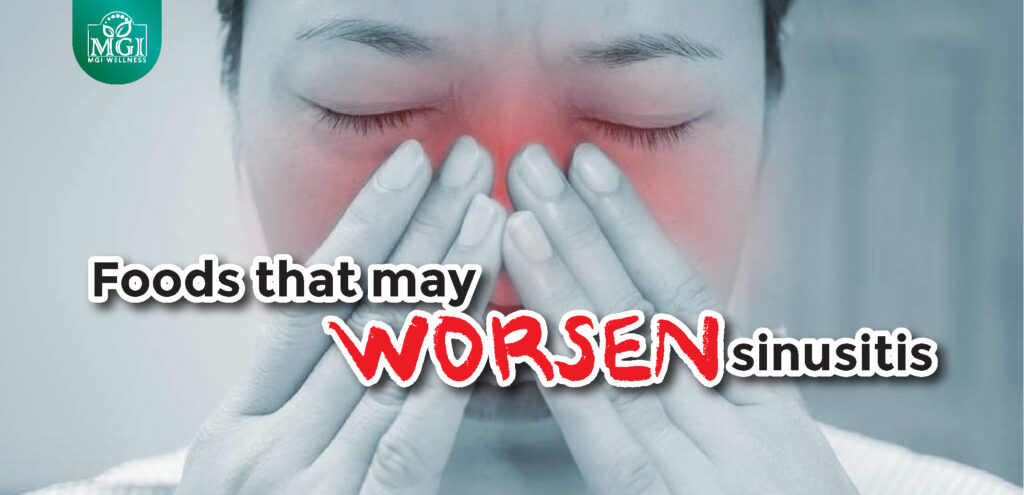Wellness
Foods that may worsen sinusitis
While there are many sinuses in the body, sinusitis often refers to the four spaces above and below the eyes that are related to the nose. The sinus is an air-filled space and would usually only have a thin layer of protective mucus to keep the space moist and trap microorganisms. They also help humidify the air you breathe. Sinusitis or more simply known as sinus infection happens when fluid builds up in the air-filled space allowing germs to grow and the lining of the sinuses becomes inflamed and swollen.
Anyone who have ever experienced sinusitis would probably appreciate the need for quick and effective treatments. Avoiding certain foods that may irritate or worsen sinusitis symptoms is one rather arguable remedy. In this article, we will be discussing foods that has been raved to best be avoided with sinusitis.
Dairy
A common belief for many years is that dairy has been thought to promote the production of mucus and phlegm. Participants from a study who received non-dairy milk (soy milk) reported significant reductions in nasal mucus secretion when compared to participants receiving dairy milk (cow’s milk). Another older study, showed that allergic reactions to milk may promote the development of nasal polyps, which is a common cause of sinusitis.
However, there also has been explanation that the problem with milk may be a sensory trick. Milk and saliva in your mouth create a somewhat thick liquid that can briefly coat the mouth and throat. The sensation that lingers may be mistaken for increased phlegm.
High sugar food
A diet high in refined sugars for instance carbonated beverages, candy, table sugar and high-fructose corn syrup has been linked to worsen sinusitis symptoms by increasing inflammation. This has to do with the growth of fungal yeast that is fed by sugar, which in turn causes an inflammatory reaction in the sinuses. The inflammation then creates swelling, which blocks the drainage from the nose and sinuses.
Studies have shown that high sugar diets may worsen sinus symptoms and increase inflammation in children with sinus symptoms, as well as that reducing the consumption of added sugar helps improve sinusitis symptoms both in children and adults.
Food high in histamine
Histamine is a chemical created in the body that is released by white blood cells into the bloodstream when the immune system is defending against a potential allergen. It can also be found in a number of foods. Histamine consumed through food is usually quickly broken down, except for those with histamine intolerance where it gets broken down less effectively, leading to a build-up in the body. This build-up will then lead to sinusitis related symptoms including sneezing, nasal congestion, runny nose, and trouble breathing. Thus, if you have a histamine intolerance, eating foods high in histamine may worsen your symptoms. Some examples of food high in histamine include processed meat, aged cheese, fermented food, and fermented beverages (kombucha and alcohol).
Food high in salicylates
For people with hypersensitivity to salicylate, they may experience unwanted side effects such as nasal polyps, nasal congestion, runny nose, sneezing or breathing difficulty. These symptoms may worsen your sinusitis. Studies have shown positive improvement in sinusitis symptoms after following a salicylate-free diet. Some examples of food which contain salicylates are beans and lentils, cauliflower, pickled vegetables, strawberries, watermelon, plums, oats, corn and buckwheat, rosemary, thyme, paprika and turmeric.
All in all, there has been some but limited research which suggests that dairy, refined sugars, high histamine foods, and high salicylate foods may worsen sinusitis symptoms, especially in those with sensitivities. However, more research is needed. If you think that these foods mentioned may be making your symptoms worst it is advisable to speak to a healthcare professional. They can help you safely perform an elimination trial while ensuring that your nutritional needs are not compromised.
References:
- Henson B, Drake TM, Edens MA. Anatomy, head and neck, nose sinuses. InStatPearls [Internet] 2021 Jul 31. StatPearls Publishing.
- Frosh A, Cruz C, Wellsted D, Stephens J. Effect of a dairy diet on nasopharyngeal mucus secretion. The Laryngoscope. 2019 Jan;129(1):13-7.
- Lill C, Loader B, Seemann R, Zumtobel M, Brunner M, Heiduschka G, Thurnher D. Milk allergy is frequent in patients with chronic sinusitis and nasal polyposis. American Journal of Rhinology & Allergy. 2011 Nov;25(6):e221-4.
- Cold symptoms: Does drinking milk increase phlegm? [Internet]. Mayo Clinic. Mayo Foundation for Medical Education and Research; 2021 [cited 2022Jul8]. Available from: https://www.mayoclinic.org/diseases-conditions/common-cold/expert-answers/phlegm/faq-20058015
- Sawani A, Farhangi M, Maul TM, Parthasarathy S, Smallwood J, Wei JL. Limiting dietary sugar improves pediatric sinonasal symptoms and reduces inflammation. Journal of medicinal food. 2018 Jun 1;21(6):527-34.
- Taw MB, Nguyen CT, Wang MB. Complementary and integrative treatments: rhinosinusitis. Otolaryngologic Clinics of North America. 2013 Jun 1;46(3):345-66.
- Comas-Basté O, Sánchez-Pérez S, Veciana-Nogués MT, Latorre-Moratalla M, Vidal-Carou MD. Histamine intolerance: The current state of the art. Biomolecules. 2020 Aug 14;10(8):1181.
- Kęszycka PK, Lange E, Gajewska D. Effectiveness of personalized low salicylate diet in the management of salicylates hypersensitive patients: interventional study. Nutrients. 2021 Mar 19;13(3):991.
- Sommer DD, Hoffbauer S, Au M, Sowerby LJ, Gupta MK, Nayan S. Treatment of aspirin exacerbated respiratory disease with a low salicylate diet: a pilot crossover study. Otolaryngology–Head and Neck Surgery. 2015 Jan;152(1):42-7.

